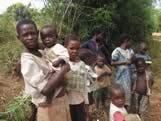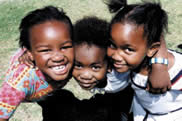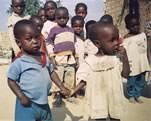Children living with HIV/AIDS in Africa

Details on our charity's latest projects:
We have projects in many other countries in Africa in total supporting about 48,000 AIDS orphans in the community. Some other project details can be found here: Other AIDS projects in African countries.
There is a HIV/AIDS epidemic engulfing much of Africa. In some countries of Africa it is estimated 40% of the working-age population has contracted HIV, with younger and more successful workers being most likely to be affected. The worst affected countries include Swaziland, Botswana, Zimbabwe and Lesotho.
How are children affected by the HIV/AIDS epidemic?
Many of those affected are parents with young children. When parents start to develop full-blown AIDS, they cannot work, and need to be looked after. Children not only have the distress of seeing their parents deteriorate but also are no longer provided for and have to try to help care for their parents. They themselves or some of their brothers and sisters may have AIDS (about half of children of HIV affected mothers in Africa end up with AIDS themselves). It is estimated that 90% of the world’s HIV-infected children live in Africa, and more than half a million die of AIDS each year.
Our project manager Jenny writes:
In April I travelled to the Chadza region of Malawi on the outskirts of Lilongwe. SOS Children works with communities there through village development committees to identify children orphaned by AIDS. I met one of these children, a girl called Lahema, she is eight years old and cares for her younger brother and sister who are both HIV positive. Having watched her parents die and now caring for her dying siblings it is hard to imagine how she can smile. She was happy to meet me and obviously pleased to see Lonnie the SOS Children nurse who accompanied me. Lonnie visits Lahema 3 times a week to provide her with medicine, food, money and clothes. Lonnie is also the only adult Lahema can share her fears with and ask for advice.
So is this hopeless situation? No, it is tragic but not hopeless. At present for those infected with HIV all we can try to ensure is that they are loved and cared for as they grow weaker. For those many young children in Africa who do not have HIV/AIDS themselves we can make a huge difference. The difference between love and abandonment, between a group of young children scavenging for scraps and a small child-led family with adequate nourishment and even the chance of school.




Share: